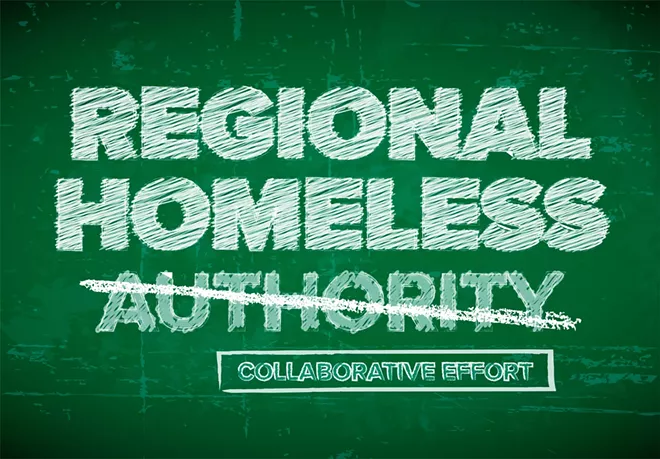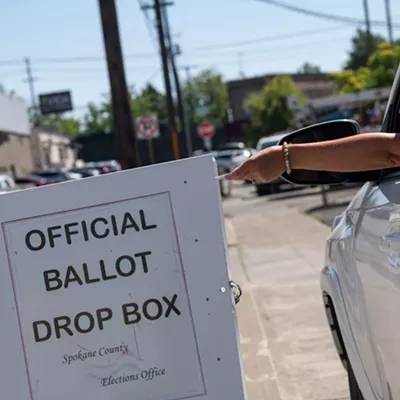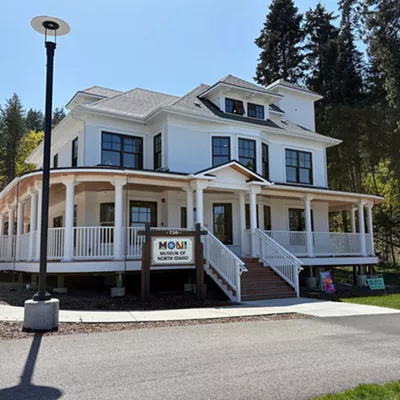The Spokane region's homeless response might be on the brink of a radical transformation.
A new effort, led by a volunteer group of former city staffers, would see every local service provider and government entity currently working on homeless issues gathered together under one umbrella. Ideally, it would take politics out of the region's response to the ever-worsening homeless crisis.
The volunteer group consists of veterans from the city of Spokane: Gavin Cooley, a former chief financial officer who worked under five mayors; Rick Romero, a city utilities director credited with thinking up a financial strategy to stop sewage from entering the river without breaking the bank; and Theresa Sanders, the city administrator under Mayor David Condon. They've been leading the charge and pitching the idea of a regional authority to local leaders for months now. (Cooley and Romero have also been writing guest Inlander opinion columns, independent of our editorial team.)
Next week, the volunteers plan to officially launch a 90-day "due diligence" period to gather feedback from community members and figure out what structure would work best for the regional entity.
Local politicians on both sides of the aisle appear to be approaching the proposal with genuine interest. But there's also trepidation. The whole idea is dependent on competing jurisdictions' ability to give up some of their authority, put aside their differences and work together.
Last week, that collaborative spirit saw its first big test. The challenge: getting elected leaders from the cities of Spokane and Spokane Valley, as well as the county, to agree on the wording of a joint statement.
THE COUNTY
The Spokane County commissioners have concerns right away.
"It's making it sound like we've already committed to whatever they decide at the end," says Commissioner Mary Kuney.
Commissioner Josh Kerns agrees. "It almost implies this 90-day due diligence period is just for show."
It's Tuesday, Feb. 7, and the county commissioners are looking over a draft statement announcing the start of the due diligence period that Cooley sent to them the night before.
The volunteers' original plan, Cooley says, was to kick things off with a massive launch event — a "kumbaya" moment bringing service providers, local businesses, elected leaders and people experiencing homelessness together in person. But the logistics were a mess, so Cooley pivoted to a joint statement instead. The current idea is for the county commission, Spokane City Council, Spokane mayor's office and Spokane Valley City Council to sign off on the statement and release it together that Friday, Feb. 10.
At Tuesday's commissioner meeting, it becomes clear: Friday isn't going to happen.
The commissioners worry the statement is too presumptuous. They want to make it clear that they've only agreed to explore the idea of a regional authority — nothing more.
The commissioners put together a list of edits for Cooley's statement that includes replacing every use of the phrase "regional authority" with "regional effort." They change the wording of sentences like "a collaborative authority will address these needs" to "a collaborative effort could address these needs." Instead of "eliminating jurisdictional and political boundaries," the commissioners suggest "moving beyond" those things.
The commissioners make plans to review the statement at a later meeting and send the edited copy to Spokane Valley and Spokane city officials.
THE CITY
Cooley stresses that the point of the 90-day period isn't to figure out how to solve homelessness in Spokane — it's to determine what type of structure should be in charge of working out how to solve the problem.
There are a few examples of what that might look like.
The regional model that's drawn the most interest from local leaders is in Houston. Houston's regional authority is structured as an independent nonprofit, led by people who aren't in politics. Cooley's volunteer group recently used money from private donors to hire Mandy Chapman Semple — who was heavily involved in the Houston model — to advise the group during the due diligence process.
In King County, the regional homeless authority is set up as an interlocal agency, with a mix of elected officials from different jurisdictions and people with lived experience on the governing board.
There are a number of other structures that could work for Spokane, Cooley says. He points to existing examples of regional coordination across Spokane jurisdictions, like the Spokane Transit Authority and the Spokane Regional Health District.
Along with local elected leaders, Cooley and the volunteers have been meeting with local businesses and homeless service providers like Zeke Smith, president of the Empire Health Foundation.
Smith really supports the idea and says a regional approach could help some of the challenges facing providers, like time spent applying for grants, and data collection and sharing. Whatever structure the entity takes, Smith hopes there will be a proper mix of stakeholders at the table.
In a rare moment of unity, both the Spokane City Council and Mayor Nadine Woodward seem to support the idea as well. Woodward traveled to Houston to learn about the city's model last fall and said in a recent video that establishing a regional authority is at the top of her list for 2023.
"Much of the groundwork has already been done, and there is great interest as we embark on what will be a generational change," Woodward said in the video.
Council President Breean Beggs says the city didn't have any major changes to the joint statement, noting that little is at stake with a nonbinding statement that doesn't carry any legal weight.
Of all the regional jurisdictions, Beggs says the city of Spokane has long shouldered the majority of the financial and other impacts that come with the region's homeless crisis. Other jurisdictions might be worried about giving up authority, but the city is happy to share some of the load, Beggs says. The city would eagerly sign off on the creation of the regional homeless authority if it came to a vote today, he says.
"The mayor and the City Council are super in favor of this idea," Beggs says. "We're not going to be the obstacle, if there is one. I'm not saying there will be. Could be a little bit out in the Valley, maybe."
THE VALLEY
Just hours after county commissioners finished with the draft statement, the Spokane Valley City Council is looking over their edits. They have a few suggestions of their own.
At the end of a sentence that reads "elected leaders will determine how to move forward," council member Laura Padden suggests adding "and may or may not agree to move forward."
Padden also takes issue with a line that reads "To guide this effort, we've selected three retired City of Spokane employees."
"We did not select them, they were presented to us," Padden says.
The fact that the three volunteers are former, high-level administrators from the city was a "red flag" for Padden. She suggests the council propose adding a representative from the Valley to the volunteer team.
At the end of the meeting, the Valley council still isn't done. Members make plans to review the statement again at a later meeting.
Pam Haley, the council-appointed Valley mayor, says she and the council members want more clarity on the purpose of the due diligence period. Some form of regional effort may be ultimately helpful, she says, but it's far too soon to commit to anything.
"It's important to at least have a conversation," Haley says. "But I'm hesitant to give up everything to a group that may or may not have the same plans. And I also want to know how it's going to be funded."
The proposed regional authority happens to coincide with the development of Spokane Valley's "Homeless Action Plan." Haley says the Valley plans to continue working on its own plan, regardless of whether or not they eventually sign on to the regional effort.
WORKING TOGETHER
Despite the delayed start and critical edits, Cooley says he's more optimistic than he's ever been and thinks the feedback so far has been constructive.On Monday, the county commissioners took another look at the joint statement. They had a few more minor edits, but overall they seemed pleased with the new language and sent the revised copy to the city again. Beggs says he expects the Spokane City Council to pass a resolution endorsing the statement Thursday.
The Valley council members are in Olympia this week, so they won't get a chance to take action on the joint statement until their Feb. 24 meeting at the earliest. Haley says she'll probably agree to sign the statement, assuming the language properly reflects her concerns about a lack of clarity.
Beggs hopes the Valley gets on board.
"It'll work way better with them at the table for the due diligence, but as long as the city and the county are on, I'm confident we can move forward," Beggs says.
Cooley says the joint statement was limited to the region's three biggest jurisdictions to avoid "mission creep." Cooley is still meeting with smaller municipalities like Cheney, Airway Heights and other West Plains towns, and he hopes they'll sign the statement and join the effort once the big three are on board.
After the 90-day period is over, the volunteer group will report its findings to the local leaders and make a recommendation for which structure the regional entity should take. That's when the real thorny questions will have to be ironed out: How much influence will each jurisdiction have? How much will it cost, and who will pay? If the regional entity wants to build shelters, where will they go?
"That will probably be a dicey day," Beggs says.
But that's if the politicians even agree to form the regional entity in the first place. The local jurisdictions might just back out and keep doing their own thing.
Cooley doesn't think that will happen. He's optimistic that at least some of the local jurisdictions will be on board. And the ones that aren't? They're welcome to sit it out. Once they see how it's going, Cooley says they're welcome to change their minds and get in on the action. ♦


























